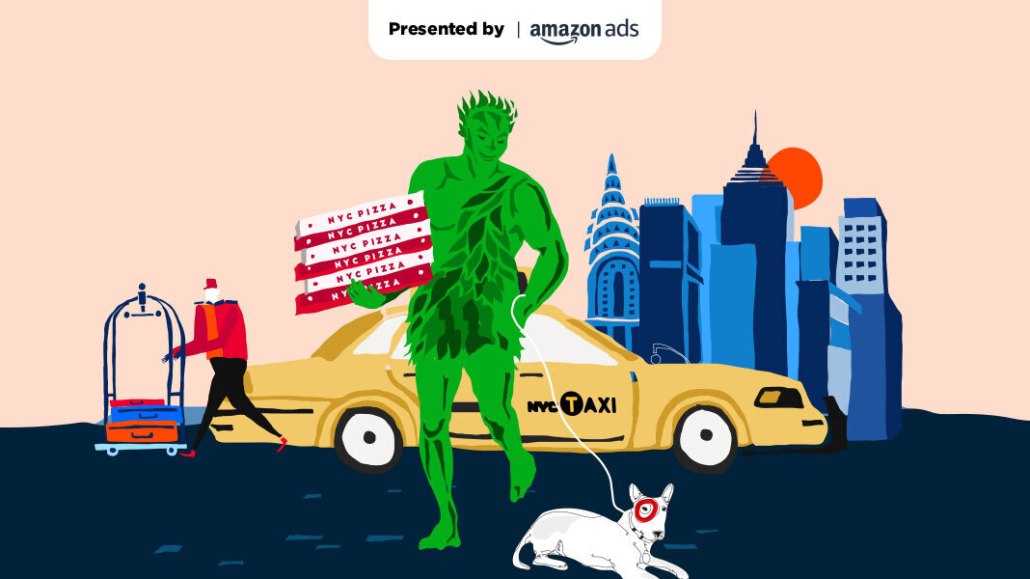Save 50% on a 3-month Digiday+ membership. Ends Dec 5.
Advertising Week Briefing: Economic uncertainty proves to be the ‘big elephant in the room’

Keep up to date with Digiday’s annual coverage of Advertising Week in New York. More from the series →
More than 10,000 people are expected to descend in-person upon the Lower East Side of Manhattan for this year’s Advertising Week New York, which will once again be a hybrid event. While there’s general excitement for its quasi-post-Covid return, the looming threat of economic uncertainty has put a damper on things, according to marketers who are going to this year’s event.
“The big elephant in the room is what’s happening with the economy,” said Laurel Rossi, CMO of ad-tech firm Infillion. “We’re being cautious and cautiously optimistic, both about the economy and also about travel.”
Last fall, the pandemic made for an air of uncertainty for many. And this year is more of the same as budgets tighten around fears of economic uncertainty. With that in mind, Infillion is sending just 30 people to attend Advertising Week this year.
The effects of the potential economic downturn aren’t limited to marketing and travel budgets. Lindsay Bennett, global head of marketing and communications at marketing agency Gale, expects the economy to be a topic of conversation at Advertising Week this year. (There are a number of economy-themed panels slated for the event, including panels titled “How Iconic Brands Use Technology and Creativity to Drive Growth in Uncertain Times” and “Recession-Proofing Brand Budgets.”)
“We can’t ignore it’s coming or pretend the industry won’t be impacted,” Bennett said in an email to Digiday, “but the smart marketers will use this time to grow their share of voice as others inevitably pull back.”
Still, attendance for the event is on the rebound, with more than 10,000 people expected to be at Advertising Week in-person this year, up from the estimated 8,220 attendees last year, according to an Advertising Week spokesperson. Meanwhile, 50,000 are expected to attend digitally, compared with the 63,000-plus people who tuned in virtually last year.
According to marketers and advertisers, events earlier this year like Cannes and SXSW set the stage for a more robust return to in-person events as attendees got more comfortable with going maskless, shaking hands and regular conference social norms. However, there are still Covid-19 cases, and Advertising Week event planners have laid out safety precautions, mostly asking event goers to stay home if they’re not feeling well.
Ad position: web_incontent_pos1
“I am personally exhausted from the flood of webinars, live streams and other virtual events showing up in my inbox every day,” Kyle Eckhart, Rain the Growth Agency’s svp of client strategy, said via email. Eckhart attended last year’s event in-person and will do the same this year in hopes of capturing unplanned, serendipitous moments with colleagues to spark business and ideas, he said. He added, “Also, there are snacks.”
Here are a few other trends we’ll be watching:
Streaming video
Connected television has become a bigger part of the conversation, and media mix, as more advertisers are spending big to get in front of the growing number of cord-cutting households. At this year’s Advertising Week, be on the lookout for panels and discussions around what measurement and attribution look like in this space, especially as Netflix has finally unveiled some details around its ad-supported product.
Metaverse
Ad position: web_incontent_pos2
Expect to hear a lot of chatter about Web3 and the metaverse. Marketers still have a lot of questions about just what exactly the metaverse can do to help them achieve their brand goals. And as inclusive marketing has continued to be a talking point over the last two years, this year’s event will include a women in the metaverse panel that will look at how women can gain a competitive edge across an expansive digital landscape.
Data privacy
Between Apple’s iOS14 update and Google’s ever-crumbling cookie, advertising isn’t getting any easier as targeting and attribution have now been muddied. This brings up another theme to watch out for at Advertising Week: how marketers and advertisers are working to target audiences all within the confines of new laws and regulations.
Creator economy
Influencer marketing and the creator economy have dominated headlines this year. Expect more of the same during Advertising Week. With the social media platforms in an arms race for creator and user attention, and, thus, ad dollars, the creator economy is sure to be a hot topic this year. “The question is, how will influencer partnerships jump off the phone and translate on other media platforms,” Esther Raphael, CMO at out of home media and technology company Intersection, said via email.
Coming up
9:15 a.m. Reimagining the consumer-advertiser relationship in a connected future, The Marketplace stage
10 a.m. Shingy speaks: creativity in the metaverse, The Amazon Ads Studio
11:15 a.m. How to go big with Gen Z in TV streaming, The Screening Room stage
12:10 p.m. The future is female, but we’re still stuck in the present, The Boardroom stage
2:35 p.m. The creator search: driving conversion and action on TikTok through innovation, The Insights Arena stage
5:30 p.m. Why action-based marketing needs to replace people-based marketing, The Tech Lab stage
More in Marketing

Ulta, Best Buy and Adidas dominate AI holiday shopping mentions
The brands that are seeing the biggest boost from this shift in consumer behavior are some of the biggest retailers.

U.K. retailer Boots leads brand efforts to invest in ad creative’s data layer
For media dollars to make an impact, brands need ad creative that actually hits. More CMOs are investing in pre- and post-flight measurement.
Ad position: web_bfu